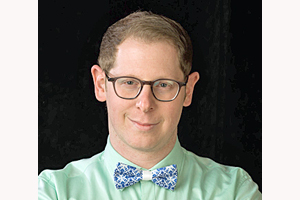Local News
Winnipeg Jewish Theatre to premiere first live show since February 2020

By BERNIE BELLAN Amidst all the plans that had either to be shelved or retooled as a result of Covid, perhaps no organization within our community has had to constantly rejig its plans more than the Winnipeg Jewish Theatre.
Beginning with the cancellation of a new play by Winnipeg’s own Daniel Thau Eleff, “Narrow Bridge”, which was scheduled to receive its world premiere on March 28, 2020, followed by a series of changes to the 2020-21 program, ultimately the WJT did find success going online with two separate productions this year: “Becoming Dr. Ruth” – in February, featuring a repeat of her award-winning role by Mariam Bernstein – and which was offered on demand to at-home audiences; and, more recently the free streaming online of “True Colours” in March.

While WJT Artistic Director Ari Weinberg was quite pleased with the reception that both those productions received from at-home audiences, he’s more than a little excited to once again being able to offer Winnipeg audiences live theatre, beginning August 26, with eight performances of a play that is particularly timely given the circumstances in which we’ve all found itself, titled “Dear Jack Dear Louise”.
Recently I had the chance to talk to Ari about this impending production which, by the way, features the youngest member of the immensely talented Frohlinger siblings, Becky Frohlinger (sister to Alexandra and Joey), along with another talented Winnipegger, Justin Stadnyk.
Following are excerpts from my conversation with Ari Weinberg:
JP&N: “When was the decision made to do a live show?”
Ari: “The plan was always to do a live show. Our plan all along was to do two digital shows, and then a live show – and this is it. We had hoped to do it in May, and then it got bumped. Then we were hoping for late June or early July, and then it got bumped. So this is actually the third time we planned to do it.”
JP&N: “What will the seating capacity be?”
Ari: “Eighty seats.”
JP&N: “How many performances will there be?”
Ari: “Eight performances. We usually do eight, but if it continues to sell as well as it has been we can add one or two shows.”
JP&N: “So tell me something about this show. I’ve never heard of it.”
Ari: “Well, the reason that almost no one has heard of it is that it actually premiered in December 2019, just before the start of Covid. We’re doing the Canadian premiere of it; it’s actually the second production of it anywhere in the world.
“Ken Ludwig is the playwright. He’s a master of comedy. He wrote ‘Lend Me a Tenor’ – a very funny farce. He wrote the book for ‘Crazy for You’, also a very funny musical.
“This is the story of his parents. All four of his grandparents met at a barbeque during the Second World War. One set had a single son, the other had a single daughter. The son was off being a doctor in the army and the daughter was off aspiring to be in musicals in New York City.
“So the grandparents thought: ‘We should get them to start writing to each other. So Jack picked up a pen and wrote to Louise and she responded, and they kept in touch throughout the war. They were supposed to meet, but various obstacles kept popping up, so they wrote letters to each other for four years and met at the end of the war – and got married, and had Ken and his brother.
“When they both passed away, he inherited the letters that they had written to each other, and he thought: ‘There’s a play here’, so it’s sort of an homage to his parents.”
JP&N: “You know, this reminds me of a play put on at the Fringe Festival a few years ago (2014, to be exact) by Susan Freedman, who was the daughter of the late Sam and Brownie Freedman. (The play was titled “Spilling Family Secrets”.) It was a one-woman show based on letters they had written to one another.”
Ari: “This one is quite hilarious, too, especially Louise. She’s quite a vivacious character who’s trying out for Broadway musicals. She’s excitable and she has all kinds of hilarious adventures that she relates to Jack throughout the play.”
JP&N: “It must involve more than reading letters.”
Ari: “No – and that’s why I planned it. It’s a perfect ‘social distancing’ play. The characters don’t even meet until the final moment of the play. They’re in their two separate worlds.
“This is actually a perfect show to do in a tent. He has his army tent and a little foot locker and she’s in a boarding house in New York City, but it’s the two of them in their separate worlds conversing with one another.”
JP&N: “Is there any singing, because I know that both Becky and Justin are very talented singers?”
Ari: “No – they’re both incredible singers, but there’s no singing in the play.”
JP&N: “So maybe we can ask them to stay after the play is over, pass a cup around, and ask them to sing for us.”
Ari: “Yah, we’ll ask them to take requests.” (Ed. note: This is all tongue in cheek, in case you think this is meant to be taken seriously.)
JP&N: “Let’s talk a little about Becky (Frohlinger) and Justin (Stadnyk). I know Becky very well and I also know Justin from a show that he was in with my son at Rainbow Stage” (which also included Alexandra and Joey Frohlinger, but not Becky, who was too young to appear on Rainbow Stage at that time).
Ari: “This is actually their fifth show together. It feels like a homecoming in many ways. It’s great to have Becky back in Winnipeg.” (Ed. note: When we last mentioned Becky in a column it was in August 2016, when Becky was appearing in a production of ‘Shrek the Musical’ at Rainbow Stage. Becky was already a seasoned performer by then, also having just graduated with a Bachelor of Fine Arts in Musical Theatre from Elon College in North Carolina.)
JP&N: “We’ve been following the careers of all three talented Frohlinger siblings for years.”
Ari: “I know, I’ve been hearing lots of anecdotes about the Frohlingers.”
(A perusal of Justin Stadnyk’s website reveals that he was born in 1985 and has been performing in the musical theatre world for years. Justin is also a dedicated yoga practitioner and teacher.)
“Something that might interest you is that Justin and I were in the same class together at Sheridan College.
“Justin became a dad during the pandemic and this is his first show back. This show is a labour of love for the both of them – as well as the Winnipeg Jewish Theatre.”
JP&N: “Okay, so how long does the show run?”
Ari: “It’s 90 minutes – without an intermission.”
JP&N: “It’s under a canopy, is it?”
Ari: “Yes, it’s under a tent. Three of the sides are open. We’ve got good air flow.”
JP&N: “Are you encouraging people to wear masks?”
Ari: “Masks are strongly recommended.”
JP&N: “Do you have to present a proof of vaccination to enter?”
Ari: “No, we checked with the province, and because we’re outdoors and because there’s good air flow, and because we’re under 100 people, and because people are socially distanced in the seats – seats are either in pairs or singles – vaccination is not mandatory. We’re assuming that the majority of our audience is vaccinated, but that’s why masks are strongly recommended.”
JP&N: “Let’s talk a little about the two shows you did online this year. I know the Dr. Ruth show did quite well.”
Ari: “Yes, it was a great success for us. We had lots of people watch it – and it was watched all over the world.
“Then we did our production of ‘True Colours’ – and it’s currently part of the Stratford Festival streaming platform.”
JP&N: “I was going to ask you about Daniel Thau-Eleff and the lousy luck he’s had. His play (‘Narrow Bridge’) has been canceled twice now, hasn’t it?”
Ari: “We have a plan to do one digital production in the fall, then two live productions, both Canadian premieres. One is a production we’re hoping to do live and in person in February, and the other in a tent again next summer. It’s a musical that we’re hoping to do live at the campus.
“Then, the following year, we’re hoping we’ll be fully back in the season, and that’s when we’re hoping ‘Narrow Bridge’ will make it to the stage.”
JP&N: “So that’ll be 2022-23 – right?”
Ari: “Yes.”
JP&N: “It’s becoming ‘A Bridge Too Far’ by now.”
Ari: “Yes, a very long, narrow bridge.”
JP&N: “Coincidentally, I’m going to be running a story this issue about the Jewish Foundation and how they came through for so many Jewish organizations during the pandemic, including Winnipeg Jewish Theatre. I don’t know if you had been able to carry on without that funding.”
Ari: “A hundred per cent. They and the Winnipeg Foundation have been great foundations of support for us.”
JP&N: “Anything else you want to say, Ari?”
Ari: “Just that we’ve already sold 50% of the available tickets (as of August 12), so this is not a show where you should sit back and think about whether you want to buy tickets. This is definitely a case where you should pick up the phone and call or get to a computer and go online and book.”
Local News
Second annual Taste of Limmud to feature Jewish dishes from around the world

By MYRON LOVE Many words in English have multiple meanings. Take the word “taste” for example. There is the literal meaning – the sense of taste; it can also mean sample – or preferences. It can be a noun or a verb.
In “A Taste of Limmud,” the term is used both in its literal meaning – as a sampling of Jewish dishes from different parts of the world, as well as a prelude to our community’s upcoming 16th celebration of Jewish learning and culture, which is scheduled for Sunday, March 15.
This is the second year for “A Taste of Limmud,” which is coming up on Thursday, February 19. The event will be held at the Shaarey Zedek and will feature Jewish dishes from Argentina, Yemen, Turkiye, Aleppo and Eastern Europe, as well as Israel .
“We sold out last year for A Taste of Limmud,” reports Raya Margulets, Winnipeg Limmud’s newly appointed co-ordinator. “We had 120 participants last year. I am hoping to have 150 this year.”
The 2025 debut of “A Taste of Limmud” was actually Margulets’ introduction to the Winnipeg Limmud co-ordinating team. Originally from Israel, Margulets’ first position with the Jewish Federation of Winnipeg was in 2022 when she was appointed Hillel director – after she had served as Hillel student president at the University of Manitoba.
She left her role with Hillel after having served as director for two years to participate in the ten-month online Israel 21c Digital Ambassador program, which is aimed at young people between the ages of 18 and 25. That program is part-time and casual, conducted remotely, intended to provide basic experience in digital communication and storytelling focused on everyday life in Israel.
“I spent a few hours a week working on simple digital content and social media, attended occasional online seminars, and participated in light collaborative projects,” Margulets reports. “The focus was on sharing positive, apolitical cultural stories rather than politics or advocacy.”
She was hired last year to oversee our first Taste of Limmud – as a special project that was funded by the Jewish Foundation of Manitoba.
She was appointed at the beginning of September as Limmud Co-ordinator, replacing Florencia Katz, the original co-ordinator, who stepped away after 15 years in the role. Katz remains a member of the Federation staff as Director of Education and Engagement. She also has a focus on the PJ Library program.
“Florencia was a great mentor and is still a big help to me,” Margulets says.
She reports that the upcoming 16th annual Winnipeg Limmud will once again feature a wide and eclectic range of speakers. “I can confirm that all of our community’s rabbis – as well as Rabbi Benarroch – will be among the presenters,” she notes. “Rabbi Benarroch will be coming from Israel and be here in person.”
Also confirmed thus far are Yaron Deckel, an Israeli journalist and broadcaster, as well as Haskel Greenfield, Distinguished Professor of Anthropology, and Winnipeg’s own Rimon Art Collective. Collective members include young Jewish artists Mishelle Aminov Kosonovsky, Yael Freifeld, Etel Shevelev, Halley Ritter, and Shan Pullan
Stay tuned for further updates as to other 2026 Winnipeg Limmud presenters on this website or go online to keep up to date or register for programs at limmudwinnipeg.org.
Local News
Sharon Delbridge’s annual health & wellness retreats in Puerto Vallarta have become popular with many Winnipeggers

By BERNIE BELLAN Over the years we have revisited stories from time to time – to catch up with individuals who have made a mark in this city and to see where their lives have taken them since the last time we wrote about them.
One such individual is Sharon Delbridge, the youngest daughter of Sol and Rachel Fink, and younger sister to Percy, Shayla (Posen), and the late Sheldon Fink (who died all too young at the age 57 in 2021).
Myron Love has written many times about Sol and Rachel Fink, who continue to amaze for their vitality – with Sol now 101 and Rachel having just turned 99.
As Sharon notes in an email sent to me, “My parents work out everyday. Not at Rady anymore. They do exercise at home & in their condo gym (200 Tuxedo) Move their bodies daily. My mom leads her and my dad daily in movement. It’s incredible.
“They have been a huge inspiration to all of us.”
Aside from the fact that the Fink family was a very musical family, their penchant for fitness is clearly something that rubbed off on Sharon, in particular.
My own wife, Meachelle, who was quite the fitness fanatic herself in her day (not that she’s been put out to pasture quite yet), profiled Sharon for The Jewish Post & News in 2015. In that story, Sharon explained how she came to be one of the most popular and best known fitness instructors, not only at the Rady JCC – where her classes in a wide variety of different areas, were – and still are, extremely popular, but at many other venues throughout Winnipeg.
Here’s part of what Sharon told Meachelle about how she came to teach so many different types of fitness classes:
“I’ve been into fitness my whole life. I come from a very musical family but also a family that always works out. When I was in my 20s I was teaching aerobics for several years as a part-time job while in university. When I had my three children (Milan, Jared and Cassie Ackerman) I ran a hand-painted clothing business in my home called Milan Designs, and I sold to ladies’ and children’s stores all over Canada.
“I was always working out and have loved fitness classes. I went back and got more certifications in my 40s. I’m certified to teach many specialties and have been actively teaching at the Rady for over 10 years. I now specialize in women’s boutique fitness: Zumba, Yoga and Barre classes. The three specialties blend beautifully together and I have a big following of people from all over Winnipeg that come to my classes. I have every Zumba certification that’s available: Zumba, Zumba Gold (for seniors), Zumba Toning (with weights), Zumba Aqua (in water), Zumba Step and Zumba Sentao (using steppers and chairs).
“I’ve taken many yoga certifications through the past 10 years and I’ve been teaching Barre classes, which are the latest and hottest classes for women. I’m always taking new training in these three specialties to continue to stay fresh and always have new and exciting things to present to my class. That’s how I stay unique in my field. I’m always learning and always developing my classes to be the best they can be. I spend tons of time finding the best music and choreographing.
“I truly feel that if you work out and look after your body, you will always have a positive outlook on life. Exercise is a huge healer mentally and physically. I have seen so many incredible changes in women that come to my classes. They have transformed their bodies and live happier and healthier lives.”
It was a year after Meachelle’s article about Sharon that Sharon and her husband, Darcy, began going to Puerto Vallarta for the winter. As Sharon noted, “I started teaching at a Yoga studio the first winter we were here in PV. It’s easy to meet people & build community when you’re teaching snowbirds from everywhere
I love sharing my love for fitness & yoga & moving our bodies.”
But, for six years prior to making Puerto Vallarta her and Darcy’s winter home, Sharon had already been conducting annual one-week health and wellness retreats in Puerto Vallarta. She has continued to conduct those retreats every year since. The most recent retreat was held from January 25-February 1 at the Fiesta Americana All Inclusive Resort.
Here’s how Sharon describes the purpose of those retreats:
“For over 15 years, my Health & Wellness Retreat has brought together women of all ages to reconnect, recharge, and celebrate movement, friendship, and balance. Hosted at a beautiful all-inclusive resort, guests can truly make the week their own holiday experience. While primarily a women’s retreat, many now bring their husbands or partners who are welcome to participate as much or as little as they choose.
“Throughout the week, we offer seven daily classes ranging from sunrise meditation and yoga to toning, Zumba, yin yoga, and our signature Aqua Zumba — which transforms into a high-energy, joy-filled pool party. Each evening, we gather for sunset yoga and take time to celebrate the beauty of the day together.
“The retreat blends wellness with enjoyment, allowing guests to indulge in the resort’s wonderful restaurants and social atmosphere while still feeling strong, energized, and revitalized. It’s a balanced, uplifting experience where participants leave feeling nourished in body, mind, and heart, often forming lifelong friendships. This year, we were proud to welcome 40 participants.”

In the picture accompanying this article you might recognize several Winnipeggers. I asked Sharon how many Winnipeggers were participants in this year’s retreat?
The answer, she said, was the majority (31) were from Winnipeg, while six were from Las Vegas, one from Ottawa and two from Edmonton.
The last two years, Sharon also noted, another well known member of the Rady JCC staff, Dona Watts-Hastings, who’s a physiotherapist, also a yoga and Pilates instructor, has joined Sharon in conducting the retreat. Sharon adds that Dona’s physiotherapy clinic is inside the Rady JCC. Dona also brings some of her clients to the retreat.
I wondered though, how active Sharon is in teaching classes when she’s back in Winnipeg? Does she never tire of teaching so many classes? I wondered.
Sharon’s answer was: “Yes, I’m still in Winnipeg half of the year and I will always teach at the Rady… Zumba, sculpt , yoga & barre class – also spinning if they need me to sub. . I teach at Assiniboine park and other gyms, too. Every morning I teach and often sub other classes. Busy all spring & summer.”
Whew! It’s tiring just reading about everything Sharon does. If you would like to find out more about next year’s health & wellness retreat in Puerto Vallarta and how you might be able to join up, contact Sharon at sharon@freshsoulfitness.com.
To watch a video of what a typical day at the retreat consisted of go to freshsoulfitness
Local News
Jess Pudavick: artist and business executive

By MYRON LOVE Jess Pudavick is a rare individual in that she combines careers as an artist and a business executive.
I first became aware of Jess last summer when she was one of the artists/craftspeople with a display table at the Gwen Secter Creative Living Centre’s annual garage and craft sale. What piqued my interest was her focus on incorporating resins in her art pieces.
Last week, while interviewing Ms. Pudavick at Super-Lite Lighting on Waverley – I learned much more about the multi-talented Ms. Pudavick.
While I have a passion for art,” she notes, “I was not interested in becoming a stereotypical starving artist.”
The daughter of Stuart and Beth Pudavick joined the company (which her father acquired in the early 1980s (along with partners Simon Simkin and Allan Hochman) 17 years ago. Her brother, Ray, also joined the company 10 years ago, Jess notes.
At Super-Lite, Jess’s title is Custom Homes Lighting Consultant. She works with builders, designers and contractors to build the lighting for the home, as well as to choose the right lights for the space. She also manages the company’s social media and website.
“I enjoy working with my dad and Ray,” she says.”I also love what I do at Super-Lite. It is similar to my feelings about my art. You don’t know the end result when you start. It is nice to see something being built from nothing and seeing the end result – and knowing how happy the client is in the end.”.
As an artist, the graduate of Brock Corydon’s Hebrew Bilingual Program, Shaftesbury Collegiate and the University of Manitoba, recalls that she started at a young age. “As a kid,” she says, “I was always doodling and drawing cartoons.”
While she has worked with several different artistic media, she observes that what she likes about creating art with resins is the challenge.
“Resin is a temperamental material,” she points out. “When you start a project, you have no idea what the finished product will look like.”
She explains that there are two ways to work with resin. You can put traditional resin in a mold and wait 24 hours for the resin to dry. Or you can speed up the process by using a UV style resin and exposing the resin to UV rays.
“I prefer letting the resin dry naturally,” she says. “I find I have more control over it.”
Her resin-infused art comes in many forms. She produces earrings and necklaces, candle holders and ashtrays, dice and computer keys. She has also created resin-infused mahjong and rummikub tiles and even sets of dominoes with paw prints. A popular item, Jess says, is a custom coloured/theme wedding set of dominoes.
“People love them,” she says of the dominoes tiles.
(The latter reflects her own passion for dogs for which she is often a foster “parent”. She notes that she also creates resin-infused memory keepsake urns for the ashes/hair or fur of beloved pets – a product that is gaining popularity.)
Then there is the resin-infused coffee table that has a place of honour in her own home. “With my love of plants and resin, my partner and I took our existing coffee table, added various clippings of my own plants and created a fun resin-sealed table,” she recounts. “It really looks cool. It is unique. it attracts visitors’ interest. Every time I look at it, I see something different.”
Jess reports that generally sells her works of art through craft sales and her Instagram page (@thejesso09) for between $10 and $30. Her major source of sales though, she adds, is through word of mouth.
But Pudavick avers that she doesn’t do her art with an eye to sales.
“I create for myself, not for the approval of others. I find it relaxing – a good way to reduce stress. It’s also rewarding to see that others want something you have created.”
She strongly believes that enjoying your work is an important element in being happy. Equally important, she notes, – both in business and art – is to have satisfied customers.


